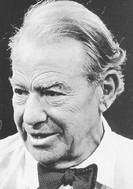"Yip" Harburg - a biography
Edgar Yipsel Harburg was born in 1896. on New York City's depressed East Side, into an extremely poor family. His deprived upbringing moulded "Yip" into a staunch supporter of left-wing causes, for which he was to be blacklisted by Hollywood in the late 1940s. Harburg odd-jobbed to pay for his schooling at Townsend Harris High, where he co-edited a literary column in the school paper with fellow pupil Ira Gershwin, who was to become his friend for life. Together, they went on to study at the College of the City of New York where they contributed verse to the publication New York World. In 1918, Harburg graduated with a BSc. The LyricistFor three years, Harburg knocked about Montevideo, in South America, before returning to New York to set up the Consolidated Electrical Appliance Co. This failed with the crash of 1929, and in desperation he turned to writing verse and articles. As luck would have it, composer and head of music at Paramount, Jay Gorney, liked his verse, supplying Yip simultaneously with a musical partner and a movie contract. They wrote six songs for the Broadway revue Earl Carroll's Sketchbook (1929), which ran successfully for a year-and-a-half. On the strength of this startling debut, Harburg was contracted to write the lion's share of the lyrics in several other shows. In 1932, he wrote lyrics for Americana to music by Burton Lane, Vernon Duke and Harold Arlen. His outstanding contribution, however, was 'Brother, Can You Spare A Dime?', to music by Jay Gorney. Ahead of its time as a social protest song, it marked the direction his work would slowly take. The Political MusicalBetween the late 1940s and early 1960s, Harburg stayed away from Hollywood after being blacklisted. Like many other freethinkers in Hollywood at the time he was the victim of the House of un-American Activities Committee, formed over the growing conservative fear of a presumed communist conspiracy. On Broadway, however, he dreamed up and worked on various 'message musicals', some of which met with surprising success. The most favourably received was the delirious satire on racial intolerance and capitalism, Finian's Rainbow (1947), with music by Burton Lane. It won the Donaldson Award for best musical of the year, ran for a strong 725 performances, and was turned into a delightful film in 1965. On the other hand, Flahooley, (1951), with composer Sammy Fain, was a nice-try spoof on big business that closed after just 40 performances. Ultimately, Yip will he remembered for the songs to which his emotive lyrics contributed so much: 'April In Paris' (with Vernon Duke). 'Its Only a Paper Moon' (Arlen) and 'Old Devil Moon' (Burton Lane) are his lasting testimony.
|
